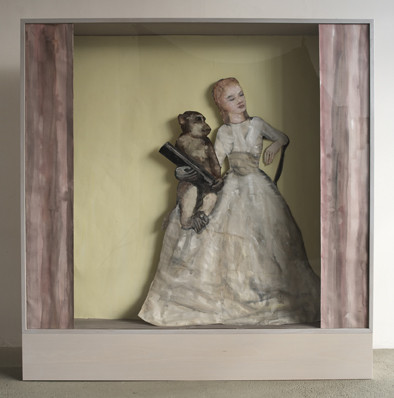Mathilde Rosier
09 Feb - 06 Jun 2010

© Mathilde Rosier
Next Attraction (Girl and Monkey), 2006
Collage papier, bois
2 parties, 162 x 152,5 x 23 cm
Courtesy galerie Iris Kadel, Karlsruhe, Allemagne
Next Attraction (Girl and Monkey), 2006
Collage papier, bois
2 parties, 162 x 152,5 x 23 cm
Courtesy galerie Iris Kadel, Karlsruhe, Allemagne
MATHILDE ROSIER
Satellite programm 3
Curator: Elena Filipovic
from 09 February 2010 until 06 June 2010
Mathilde Rosier makes artworks that are decidedly uncontemporary. Without resorting to nostalgia or passeism, they seem nevertheless out of time. They are also, one could say, out of place, exploring as they do the slippery border between theater and the real, nature and culture. In the film Entr’acte (2003), made in collaboration with Polish artist Paulina Olowska, the colors of the film blend in with the patina of the walls to form the yellowed shades of a bygone era. The film’s “action” has been thus described: “The filmic image, nearly as static as a Baroque tableau, depicts the conservatory of a palace which opens on to a park. In the film, Rosier herself sits at a piano, immersed in playing seemingly unrelated tones. A young man poses beside her, stretched out motionless in an armchair as if deep in sleep. The simple scene reveals from time to time, the outline of a figure who wanders through the semi-darkness outside.” Recalling the filmic tradition of both Luis Buñuel and Marguerite Duras, the film’s decadent interior opening onto a window of lush nature announces what are recurrent motifs in Rosier’s oeuvre: the nearly immobile and highly oneric scene uses many of art history’s known conventions (tableaux vivant, painterliness, landscape, portraiture) to question the actuality of the “real.” Moreover, in that film, as in so many of her others, a temporality that barely conforms to the conventions of motion pictures makes the image carrier of a tension between its theatricality and its almost suspended action.
Extending her interest in the theatrical, Rosier constructs an elaborate, newly commissioned installation in three parts for the Jeu de Paume: including a film made in the countryside in which a theatrical stage is the backdrop, an exact reconstruction of the film stage in the Jeu de Paume, and various props from the film brought to the actual space of the exhibition. Taking the viewer envers le décor, Rosier’s new film and its reconstructed elements compose a visual troubling between fact and fiction, inside and outside, the exhibition space and theater that leaves the visitor wondering whether the real can be located at all.
Exhibition produced with the support of
the Fondation Nationale des Arts Graphiques (FNAGP),
in collaboration with la Cité internationale des Arts
Satellite programm 3
Curator: Elena Filipovic
from 09 February 2010 until 06 June 2010
Mathilde Rosier makes artworks that are decidedly uncontemporary. Without resorting to nostalgia or passeism, they seem nevertheless out of time. They are also, one could say, out of place, exploring as they do the slippery border between theater and the real, nature and culture. In the film Entr’acte (2003), made in collaboration with Polish artist Paulina Olowska, the colors of the film blend in with the patina of the walls to form the yellowed shades of a bygone era. The film’s “action” has been thus described: “The filmic image, nearly as static as a Baroque tableau, depicts the conservatory of a palace which opens on to a park. In the film, Rosier herself sits at a piano, immersed in playing seemingly unrelated tones. A young man poses beside her, stretched out motionless in an armchair as if deep in sleep. The simple scene reveals from time to time, the outline of a figure who wanders through the semi-darkness outside.” Recalling the filmic tradition of both Luis Buñuel and Marguerite Duras, the film’s decadent interior opening onto a window of lush nature announces what are recurrent motifs in Rosier’s oeuvre: the nearly immobile and highly oneric scene uses many of art history’s known conventions (tableaux vivant, painterliness, landscape, portraiture) to question the actuality of the “real.” Moreover, in that film, as in so many of her others, a temporality that barely conforms to the conventions of motion pictures makes the image carrier of a tension between its theatricality and its almost suspended action.
Extending her interest in the theatrical, Rosier constructs an elaborate, newly commissioned installation in three parts for the Jeu de Paume: including a film made in the countryside in which a theatrical stage is the backdrop, an exact reconstruction of the film stage in the Jeu de Paume, and various props from the film brought to the actual space of the exhibition. Taking the viewer envers le décor, Rosier’s new film and its reconstructed elements compose a visual troubling between fact and fiction, inside and outside, the exhibition space and theater that leaves the visitor wondering whether the real can be located at all.
Exhibition produced with the support of
the Fondation Nationale des Arts Graphiques (FNAGP),
in collaboration with la Cité internationale des Arts
